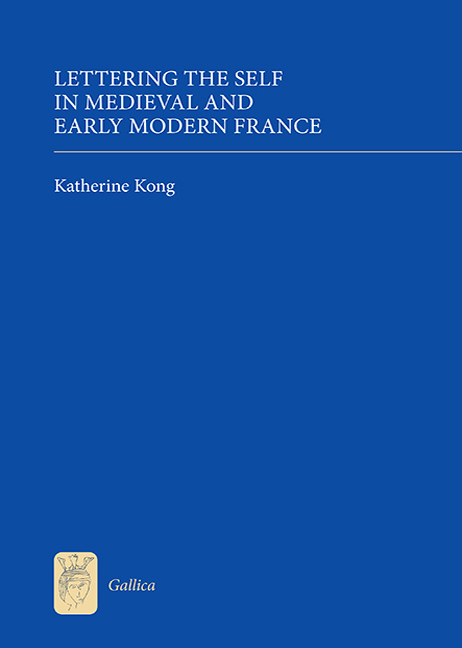Book contents
- Frontmatter
- Contenst
- Acknowledgements
- Introduction
- 1 Love Letters in the Monastery: Ambiguous Lessons and Epistolary Play in the Verses of Baudri of Bourgueil and Constance of Angers
- 2 Writing the Subjunctive into the Indicative: Commanding Performances in the Letters of Abelard and Heloise
- 3 Virilis Femina: Christine de Pizan and the Gender of Letters
- 4 The Pursuit of Spiritual Quietude in the Correspondence of Marguerite de Navarre and Guillaume Briçonnet
- 5 The Foedus Amicitiae of Etienne de la Boétie and Michel de Montaigne
- Conclusion: Conducting Oneself Through Letters
- Bibliography
- Index
- Miscellaneous Endmatter
1 - Love Letters in the Monastery: Ambiguous Lessons and Epistolary Play in the Verses of Baudri of Bourgueil and Constance of Angers
Published online by Cambridge University Press: 28 April 2017
- Frontmatter
- Contenst
- Acknowledgements
- Introduction
- 1 Love Letters in the Monastery: Ambiguous Lessons and Epistolary Play in the Verses of Baudri of Bourgueil and Constance of Angers
- 2 Writing the Subjunctive into the Indicative: Commanding Performances in the Letters of Abelard and Heloise
- 3 Virilis Femina: Christine de Pizan and the Gender of Letters
- 4 The Pursuit of Spiritual Quietude in the Correspondence of Marguerite de Navarre and Guillaume Briçonnet
- 5 The Foedus Amicitiae of Etienne de la Boétie and Michel de Montaigne
- Conclusion: Conducting Oneself Through Letters
- Bibliography
- Index
- Miscellaneous Endmatter
Summary
Some time toward the end of the eleventh century or the beginning of the twelfth, Abbot Baudri of Bourgueil wrote a letter in verse to Constance of the convent of Le Ronceray praising her beauty and eloquence, extolling the virtues of virginity, and celebrating their special love. However, lest she misunderstand the nature of their relationship, he is quick to assure that
Nolo vir esse tibi neque tu sis femina nobis;
Os et cor nostram firmet amiciciam.
Pectora iungantur, sed corpora semoveantur;
Sit pudor in facto, sit iocus in calamo.
I do not want to be your husband, nor you to be my wife:
Let mouth and heart confirm our friendship.
Let our hearts be joined, but our bodies remain apart;
Let the shame be in the act, let the game be in the pen.
Baudri seems eager to establish the terms of their relationship by clarifying what it is not. Protestation begets suspicion, however, and this passage from his letter-poem to Constance invites a few questions: what is the nature of their friendship, and why would it require clarification? To what shameful act is Baudri alluding? And how, exactly, are their hearts to be joined? His verse-epistle references a host of letter-writing genres and the relationships they imply, and when his playfully contradictory verse enters into dialogue with Constance's resistant reply – which is contradictory in its own way – they show how epistolary positions can be deployed to productive effect, creating new and specifically epistolary ways of thinking about and expressing the self.
Baudri, abbot of Bourgueil-en-Vallé by the early 1080s and archbishop of Dol in 1107, produced diverse writings, including religious and historical works and amorous letter-poems. He is considered part of a group of ecclesiastics referred to as the Loire poets who composed varied secular writings, including poems of a seemingly personal nature, addressed to fellow religious and to young men and women. Given this seeming convention of playful and often amorous verse composition among his contemporaries, Baudri's eagerness to profess the innocence of his relationship with Constance is conspicuous. It also scripts a particular kind of addressee: whether one to whom he had made amorous advances or one who had made advances to him, his letter creates an addressee with expectations to be deflected.
- Type
- Chapter
- Information
- Lettering the Self in Medieval and Early Modern France , pp. 15 - 54Publisher: Boydell & BrewerPrint publication year: 2010



